
32.3K
Downloads
59
Episodes
Social Protection Podcast is brought to you by socialprotection.org. We’re a knowledge sharing and capacity building platform, open to social protection practitioners, policy-makers, and experts, as well as academics and students. Social protection is a large and growing field, that has also achieved increased profile and salience since 2020 due to COVID-19. From building delivery systems and protecting People with Disabilities, to social protection financing and school feeding – there is no shortage of topics for Social Protection Podcast to tackle. Each month we will aim to bring you rich, interesting and different content. Through interviews, discussions and debates with experts and practitioners, Social Protection Podcast will illuminate new research and bring a range of perspectives to debates and controversies as well as areas of growing consensus.
Episodes
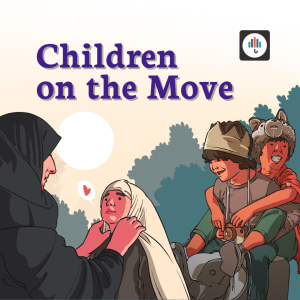
Thursday Oct 26, 2023
Ep. 32 | Children on the Move
Thursday Oct 26, 2023
Thursday Oct 26, 2023
In 2022, an estimated 100 million people were displaced, and more than 40 million of those were children. Many of these children were displaced for at least five years, often much longer, and most are hosted in low- and middle-income countries, where social protection systems often face many restrictions.
In this episode, we discuss how some countries are taking steps towards extending social protection to displaced children and their families, while slowly building systems for host populations. We examine the consequences of displacement for host countries and host communities, the factors leading to children’s exclusion in these countries, and some examples of programmes taking an integrated approach.
At the end of this episode, in lieu of our usual Quick Wins segment, we're featuring a special update on how cash and voucher assistance is being implemented in the unfolding humanitarian crisis in Gaza.
Meet our guests:
- Christina Lowe, Research Associate at ODI
- Nupur Kukreti, Policy Specialist, and lead on social protection in humanitarian and fragile contexts, UNICEF
- Rana Nassar, Regional Representative in the CALP network in the Middle East and North Africa.
Resources:
- Publication | Strengthening inclusive social protection systems for displaced children and their families.
- Publication | A promise of tomorrow: the effects of UNHCR and UNICEF cash assistance on Syrian refugees in Jordan.
- Publication | Improving social protection for migrants, refugees and asylum seekers in Egypt: an overview of international practices.
We have launched the Social Protection Digest, a quarterly compilation that brings together practitioner guides, evidence-based studies, and policy and conceptual discussions on a wide range of topics. Carefully hand-picked by our team at socialprotection.org
The digest serves as an essential resource for you to keep up with what's new in social protection.
After you have read the Social Protection Digest, let us know what you think by taking our three-minute survey.
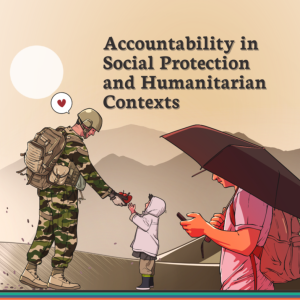
Thursday Sep 28, 2023
Ep. 31 | Accountability in Social Protection and Humanitarian Contexts
Thursday Sep 28, 2023
Thursday Sep 28, 2023
In this engaging episode, we delve into the vital concept of accountability within social protection programmes and humanitarian initiatives. Our host, Jo Sharpe, joins experts Suchi Pande and Louisa Feres for a deep dive into why accountability is the lynchpin of programme effectiveness.
Our guests shed light on the fundamental elements of accountability, including communication strategies, outreach efforts, grievance redressal mechanisms, and the crucial role of audits. Louisa provides unique insights into the various ways accountability is perceived and practiced within humanitarian contexts, challenging conventional wisdom.
Join us as we unravel this intricate web that ensures the success of social protection programmes.
Meet our guests:
- Suchi Pande, Scholar in Residence, Accountability Centre, American University
- Louisa Seferis, Independent Humanitarian Practitioner and member, Better Assistance in Crises (BASIC) research team
- Kamilla Adan Hassan, Independent Researcher from Baidoa, Somalia
For the Quick Wins segment:
- Valérie Schmitt, Deputy Director, Social Protection Department, ILO
Resources:
- Accountability in crises: connecting evidence from humanitarian and social protection approaches to social assistance
- Struggles for Accountability in the 2022 Cost-of-living Crisis: Lessons from the Global Protest Wave
- The Politics of Complaint: A Review of the Literature on Grievance Redress Mechanisms in the Global South
Quick Wins
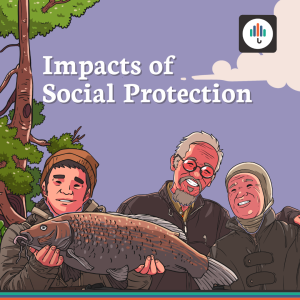
Thursday Aug 31, 2023
Ep. 30 | Impacts of Social Protection
Thursday Aug 31, 2023
Thursday Aug 31, 2023
This September marks the eighth anniversary of socialprotection.org, and we are celebrating across the platform by looking at social protection and its impacts.
This episode features a wide-ranging discussion on this theme, what we know about what social protection can do and how that evidence has influenced policy, practice and the global spread of ideas to shape the sector into what it is today.
In the Quick Wins segment, we preview our Humans of Social Protection series, in which people who benefit from social protection programmes tell their own stories of how they have impacted their lives.
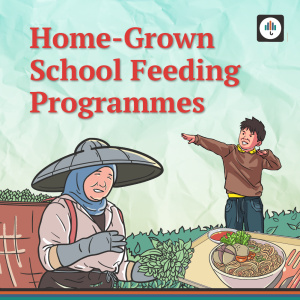
Thursday Jul 27, 2023
Ep. 29 | Home-Grown School Feeding Programmes
Thursday Jul 27, 2023
Thursday Jul 27, 2023
It is estimated that around 418 million children benefit from school meals—around 41 per cent of children enrolled in primary school, a figure that has been increasing despite interruptions due to the COVID-19 pandemic. As a social protection mechanism, school-feeding programmes play a crucial role for children and families, especially when combined with local procurement policies for local smallholder farmers.
In this episode, we discuss how school feeding programmes impact vulnerable households and smallholder farmers, as well as how better to combine these two aspects in home-grown school feeding initiatives. We also explore the role of international cooperation in sharing experiences and advancing good practices.
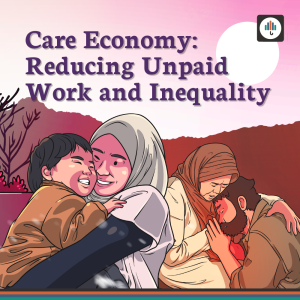
Thursday Jun 29, 2023
Ep. 28 | Care Economy: Reducing Unpaid Work and Inequality
Thursday Jun 29, 2023
Thursday Jun 29, 2023
The value of unpaid care and domestic work has been estimated at around 11 trillion US dollars—roughly 9 per cent of the world’s gross domestic product (GDP)—while low-paid domestic workers make up more than 20 per cent of the global care workforce. Social protection mechanisms can play a major role in achieving a balance between increasing access to high-quality care and reducing gender inequalities resulting from unpaid care work.
This episode focuses on how social protection mechanisms, particularly social care services, can help ameliorate the inequities involved in care work, including access, recognition and remuneration.
Meet our guests:
- Silke Staab, Research Specialist at UN Women
- Adriana Paz Ramírez, Latin America Regional Coordinator for the International Domestic Workers Federation
Resources:
- Child Care Services and Women’s Work
- UN Women. 2023. Innovations in Childcare to Advance Women’s Economic Empowerment
- UN Women. 2022. Increase Women’s Economic Empowerment by Transforming the Care Economy. Economic Justice and Rights Action Coalition, Economic Empowerment Section of UN Women.
For our Quick Wins segment, Ralf Radermacher, Head of the Social Protection Sector Initiative at GIZ, shared some key takeaways from the Global Forum on Adaptive Social Protection, a 3-day event that gathered policymakers, practitioners, and social protection experts to jointly examine and discuss the scope and potential of ASP to foster resilience and promote adaptation.
Quick Wins Resource
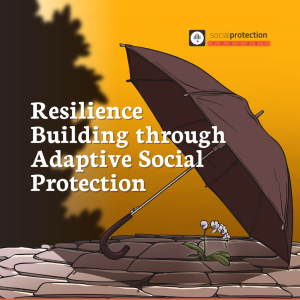
Thursday Jun 01, 2023
Ep. 27 | Resilience Building through Adaptive Social Protection
Thursday Jun 01, 2023
Thursday Jun 01, 2023
Adaptive Social Protection is an area of social protection that aims to build resilience of poor and vulnerable households by developing their capacity to prepare for, cope with, and adapt to shocks. In this episode, we are looking at adaptive and shock-responsive social protection in action in some of the most disaster-affected parts of the world.
We talk about how ASP can help build the resilience of households and enable people to take anticipatory actions before the onset of a shock. We draw from experiences in the Philippines and the Caribbean to learn how programmes can contribute to this type of approach, what is the importance of building appropriate registries and information systems, and what kind of financial instruments are put in place to funding ASP responses.
Meet our Guests:
- Riyad Katkhoda, Social Protection & Cash-Based Lead at the Caribbean Multi-country Office for the United Nations World Food Program
- Rosela Agcaoili, Social Policy Specialist at UNICEF Philippines
For our ‘’Quick Wins’’ segment, James Jumba, Independent Consultant, who previously worked as a Social security prosecutor at the National Social Security Fund in Kenya and is a former socialprotection.org Ambassador, shares with us the highlights of the Kenya Social Protection Conference and how Kenya could benefit for more resilience building approaches to climate risks.
Episode Links:
- E-learning | Micro-course series on Adaptive Social Protection
- Publication | Joint reviews for Adaptive Social Protection Systems - A working paper
- Publication | Adaptive Social Protection: Building Resilience to Shocks
- Publication | Strengthening Resilience through Social Protection Programs: Guidance Note
- Publication | Disaster Risk Finance for Adaptive Social Protection
- Publication | Adaptive Social Protection – The delivery chain and shock response
- Publication | Building on government systems for shock preparedness and response: The role of social assistance data and information systems
Quick Wins Links
- Event | The Kenya Social Protection Conference 2023
- Publication | Building resilience to climate risks through social protection: from individualised models to systemic transformation
Additionally, do not forget to take your time through our 5-minute annual satisfaction survey and register for the upcoming Global Forum on Adaptive Social Protection.
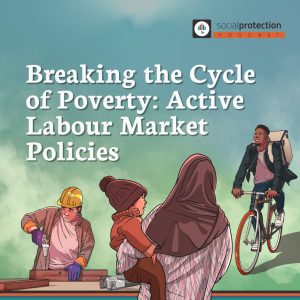
Thursday Apr 27, 2023
Ep. 26 | Breaking the Cycle of Poverty: Active Labour Market Policies
Thursday Apr 27, 2023
Thursday Apr 27, 2023
In this episode, our guests focus on the role of active labour market policies (ALMPs) in guaranteeing, supporting or even creating income-generation activities. Among other topics, we discuss the possible role of ALMPs in reducing informality in developing countries, and how well-integrated they are with other social protection mechanisms such as social insurance and social security.
Guests for this episode include:
- Veronica Escudero, Senior Economist, ILO
- Denni Pusba Purbasari, Executive Director, PMO Prakerja
- Jean Claude Muhire, Rwanda Program Director, Ultra-Poor Graduation Initiative (UPGI)
In the “Quick Wins” segment, Jean Claude Muhire, Rwanda Programme Director for the Ultra-Poor Graduation Initiative, BRAC, explains how ‘Graduation’ approaches, famous for being implemented in Bangladesh and Southeast Asia, are now being implemented in different contexts such as in Rwanda.
Quick Wins links:
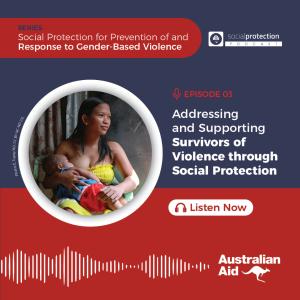
Thursday Mar 30, 2023
Thursday Mar 30, 2023
In this episode of the "Social Protection for Prevention of and Response to Gender-based Violence" series, our guests talk about how social protection schemes can provide assistance to people fleeing gender-based violence. These people are vulnerable and may need many kinds of support.
We look at examples of programmes providing cash support for survivors of domestic violence, as well as those that facilitate access to other services, such as referral pathways, healthcare, housing, etc.
Guests for this episode include:
- Tara Patricia Cookson, Assistant Professor of Gender, Development and Global Public Policy at the University of British Columbia and co-founder of Ladysmith;
- Merike Blofield, Director of the Institute for Latin American Studies at the German Institute for Global and Area Studies and Professor of Political Science at the University of Hamburg; and
- Gerson Nombora, Child Protection Specialist at UNICEF Mozambique.
In the “Quick Wins” segment, Mayra Cardozo, a Brazilian lawyer and gender researcher, member of the National Human Rights Commission of the Federal Council of the National Bar Association of Brazil and Professor of Criminal Law at EPD, shares some of the findings of her research on the programmes in place in Brazil that help women and children who are survivors of domestic violence.
The joint webinar and podcast series "Social Protection for Prevention of and Response to Gender-Based Violence" is produced by socialprotection.org and the Australian Department of Foreign Affairs and Trade (DFAT), with support from the UK Foreign, Commonwealth and Development Office (FCDO) and the United Nations Children's Fund (UNICEF). Tune in for the first webinar of the series, Girls Deserve Better: Countering Violence Against Adolescents through Social Protection, taking place on 28 March at 8.30 AM EDT.
Episode links:
Webinar: Harnessing Social Protection the Address Violence against Women and Girls
Book: Unjust Conditions: Women’s Work and the Hidden Cost of Cash Transfer Programs
Article: UNICEF Mozambique shows how 'cash and care' accelerate child well-being
Quick Wins link:
Article: Financial Support for Victims of Domestic Violence in Brazil
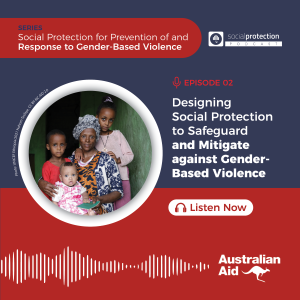
Thursday Mar 16, 2023
Thursday Mar 16, 2023
In this episode of the "Social Protection for Prevention of and Response to Gender-Based Violence" series, our guests discuss how economic factors can drive gender-based violence at the community level, and why this is important for social protection programming. The focus is on designing social protection programmes that can prevent gender-based violence against women and people with diverse gender identities, expressions, and sexual orientations (SOGIESC).
The guests draw on available evidence and practical experience to discuss various aspects of the social protection delivery chain, including targeting, registration, payment, and the unique risks and issues related to people with diverse SOGIESC.
Guests for this episode include Shalini Roy, Senior Research Fellow at the International Food Policy Research Institute (IFPRI), and Emily Dwyer, Founder and Co-Director of Edge Effect.
In the "Quick Wins" segment, two guests from the World Bank—Alessandra Heinemann, Social Protection Specialist, and Gender Lead, and Palak Rawal, Gender and Social Protection Consultant—offer practical advice on designing social protection programmes that can safeguard and prevent gender-based violence. They also share additional resources for further reading on the topic.
The joint webinar and podcast series "Social Protection for Prevention of and Response to Gender-Based Violence" is produced by socialprotection.org and the Australian Department of Foreign Affairs and Trade (DFAT), with support from the UK Foreign, Commonwealth and Development Office (FCDO) and the United Nations Children's Fund (UNICEF). Tune in for the first webinar of the series, Girls Deserve Better: Countering Violence Against Adolescents through Social Protection, taking place on 28 March at 8.30 AM EDT.
Episode links:
- Publication: Cash transfers and intimate partner violence: A research view on design and implementation for risk mitigation and prevention
- Publication: We don’t do a lot for them specifically: A scoping report on gaps and opportunities for improving diverse SOGIESC inclusion in cash transfer and social protection programs, during the COVID-19 crisis and beyond
- Podcast: How can social protection impact gender-based violence?
Quick Wins links
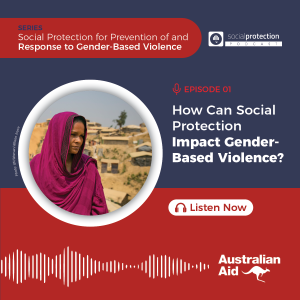
Thursday Feb 23, 2023
GBV Series Ep. 1 | How Can Social Protection Impact Gender-Based Violence?
Thursday Feb 23, 2023
Thursday Feb 23, 2023
Kicking off the three-part series ‘’Social Protection for Prevention of and Response to Gender-Based Violence’’, this episode presents a deep dive into what we know about the impacts of social protection on Gender-Based Violence (GBV) and some of the remaining knowledge gaps. We look at economic empowerment programmes and how they can help reduce economic stress and challenge gender norms that often drive violence in community settings.
Drawing from the available evidence, our guests were also invited to reflect on both the positive pathways through which social protection can contribute to reducing intimate partner violence (IPV) and the possibility of it introducing risks of increased violence. Finally, as some food for thought, what would a feminist social protection policy look like?
Our guests for this episode:
- Ana Maria Buller, Associate Professor in Social Sciences and Director of the Gender Violence and Health Centre, London School of Hygiene and Tropical Medicine
- Lusajo Kajula, Principal Investigator, UNICEF Office of Research - Innocenti
- Amber Peterman, Research Associate Professor, University of North Carolina at Chapel Hill
For our ‘Quick Wins’ segment, Wessel van den Berg (MenCare Officer at Equimundo: Center for Masculinities and Social Justice) talks about ways to engage men in the dialogue around gender norms and roles as part of a gender transformative approach. What does this entail for social protection?
The ‘’Social Protection for Prevention of and Response to Gender-Based Violence’’ series is produced by socialprotection.org and the Australian Department of Foreign Affairs and Trade (DFAT), with the support from UK Foreign, Commonwealth and Development Office (FCDO) and The United Nations Children's Fund (UNICEF).
Episode links:
Public Work Programs and Gender-Based Violence : Evidence from Lao PDR
Domestic violence and workfare: An evaluation of India’s MGNREGS
Public Work and Private Violence
Cash Transfer and IPV Research Collaborative
Quick Wins links:
Applying a Masculinities Lens to the Gendered Impacts of Social Safety Nets
MenCare: A Global Fatherhood Campaign
